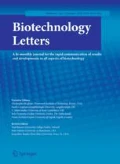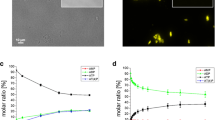Abstract
Polyphosphate kinases 2 (PPK2) are key enzymes for polyphosphate utilisation in bacteria. The genome of Ruegeria pomeroyi, a marine α-proteobacterium, includes three Pseudomonas aeruginosa PPK2 homologs. We expressed these homologs in Escherichia coli as soluble proteins, purified the protein products and compared their metal, pH and nucleotide preferences. The optimal pH was 8.0 for SPO1727 and 9.0 for SPO1256. The SPO0224 gene product had two pH optima at eight and ten. The SPO0224 protein showed little dependence on metal presence, while SPO1256 required Mg2+. SPO1727 required Mg2+ but accepted other ions as well.




Similar content being viewed by others
References
Achbergerová L, Nahálka J (2011) Polyphosphate-–an ancient energy source and active metabolic regulator. Microb Cell Fact 10:63
Achbergerová L, Nahálka J (2014) PPK1 and PPK2—which polyphosphate kinase is older? Biologia 69:263–269
Buchholz A, Takors R, Wandrey C (2001) Quantification of intracellular metabolites in Escherichia coli K12 using liquid chromatographic-electrospray ionization tandem mass spectrometric techniques. Anal Biochem 295:129–137
Kornberg A (1995) Inorganic polyphosphate: toward making a forgotten polymer unforgettable. J Bacteriol 177:491–496
Kornberg A, Kornberg SR, Simms ES (1956) Metaphosphate synthesis by an enzyme from Escherichia coli. Biochim Biophys Acta 20:215–227
Kulaev IS (1975) Biochemistry of inorganic polyphosphates. Rev Physiol Biochem Pharmacol 73:131–158
Moreno SNJ, Docampo R (2013) Polyphosphate and its diverse functions in host cells and pathogens. PLoS Pathog 9:e1003230
Nahalka J, Patoprsty V (2009) Enzymatic synthesis of sialylation substrates powered by a novel polyphosphate kinase (PPK3). Org Biomol Chem 7:1778–1780
Nocek B, Kochinyan S, Proudfoot M et al (2008) Polyphosphate-dependent synthesis of ATP and ADP by the family-2 polyphosphate kinases in bacteria. Proc Natl Acad Sci USA 105:17730–17735
Zhang H, Ishige K, Kornberg A (2002) A polyphosphate kinase (PPK2) widely conserved in bacteria. Proc Natl Acad Sci USA 99:16678–16683
Acknowledgments
This work was supported by the VEGA project No.: 2/0136/13. This contribution is the result of the project implementation: Centre of Excellence for White-Green Biotechnology, ITMS 26220120054, supported by the Research and Development Operational Programme funded by the ERDF.
Author information
Authors and Affiliations
Corresponding author
Rights and permissions
About this article
Cite this article
Achbergerová, L., Nahálka, J. Degradation of polyphosphates by polyphosphate kinases from Ruegeria pomeroyi . Biotechnol Lett 36, 2029–2035 (2014). https://doi.org/10.1007/s10529-014-1566-6
Received:
Accepted:
Published:
Issue Date:
DOI: https://doi.org/10.1007/s10529-014-1566-6




